Services
We Provide

Understanding Tongue-Tie (Ankyloglossia)
Tongue-tie, medically known as ankyloglossia, is a condition present at birth that restricts the movement of the tongue due to an unusually short, thick, or tight band of tissue (lingual frenulum) that tethers the bottom of the tongue to the floor of the mouth. This restriction can affect various functions involving the tongue, including speaking, eating, and breastfeeding. Understanding the causes, symptoms, diagnosis, and treatment options for tongue-tie is crucial for effectively managing this condition and promoting optimal oral function.
Diagnosis of Tongue-Tie
Diagnosing tongue-tie typically involves a comprehensive evaluation by a healthcare provider, often a pediatrician, pediatric dentist, or an otolaryngologist (ear, nose, and throat specialist). During the examination, the provider may assess the appearance and mobility of the tongue and observe for signs of restriction in tongue movement. Additional tests, such as the Hazelbaker Assessment Tool for Lingual Frenulum Function or the Coryllos Assessment Tool for Tongue-Tie, may be used to evaluate the severity of tongue-tie and its impact on oral function.
Causes of Tongue-Tie
The exact cause of tongue-tie is not always known, but it is believed to occur during fetal development when the lingual frenulum fails to separate properly from the floor of the mouth. Several factors may contribute to the development of tongue-tie, including genetic predisposition, abnormal development of the lingual frenulum, or certain medical conditions that affect fetal development.
Symptoms of Tongue-Tie
Common symptoms of tongue-tie may include:
- Difficulty Breastfeeding: Infants with tongue-tie may have difficulty latching onto the breast, leading to ineffective breastfeeding and inadequate milk transfer.
- Speech Difficulties: Children and adults with tongue-tie may experience speech difficulties such as articulation problems, lisping, or difficulty pronouncing certain sounds.
- Difficulty Eating: Tongue-tie can affect the ability to chew, swallow, and manipulate food in the mouth, leading to feeding difficulties and potential nutritional issues.
- Oral Hygiene Issues: Tongue-tie may interfere with proper tongue movement during oral hygiene practices such as brushing and flossing, leading to oral hygiene issues such as tooth decay or gum disease.
- Tongue Mobility Issues: Restricted tongue movement may affect activities involving the tongue, such as licking, kissing, or playing wind instruments.
It’s important to seek medical attention if you or your child experience symptoms of tongue-tie, as early diagnosis and treatment can help improve oral function and prevent potential complications. With proper management, individuals with tongue-tie can achieve optimal oral health and function.
18+
years
of experience

Dr. Mukesh Kumar Ramani
Dr. Mukesh Kumar Ramani is a dedicated Specialist ENT Surgeon at Aster Clinic (Aster Jubilee Medical Complex) in Burdubai, Dubai. With over 18 years of experience in the field, Dr. Ramani has garnered expertise in various aspects of Otorhinolaryngology.
He completed his MBBS from Thanjavur Medical College, Tamilnadu, India, followed by MS (ENT) from B. J. Medical College, Ahmedabad, India, and DNB from the National Board of Examinations, New Delhi, India. Dr. Ramani’s extensive academic background is complemented by his passion for delivering high-quality patient care.
